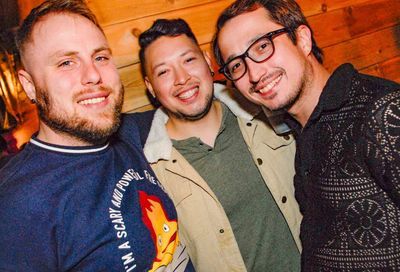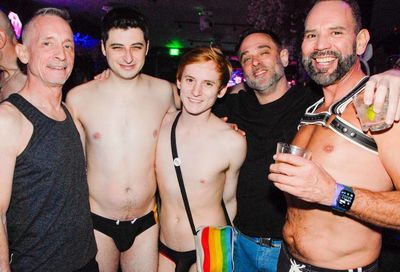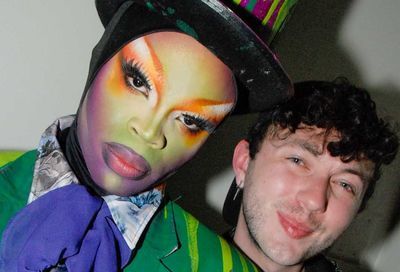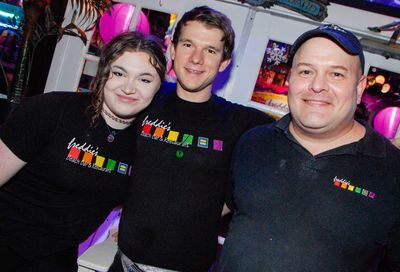Grassroots & Gigabytes
Michael Crawford traces his D.C. path from marching to marriage to blogging
In the streets or online, you may already know Michael Crawford. Did he ask you to ”get out the vote” for Barack Obama while serving as Obama Pride Co-Chair Phil Attey’s campaign wingman? Maybe you’ve read his blog posts on The Bilerico Project. Or maybe you sat in the audience at a http://DC for Marriage town-hall meeting, over which Crawford, a founder of this project of The D.C. Center, presided.
Since arriving in D.C. nearly a decade ago to work for the Millennium March, Crawford, 41, has steadily entrenched himself in the workings of the local GLBT community. That he does it with a sort of self-controlled, measured air of purpose may be slightly intimidating. Rest assured, that tiny bit of hair on his head is not always up.
”Essentially, I have my game face on. We need to sometimes temper that passion a little bit,” Crawford explains with characteristic calm. ”But I’m really a teenage girl. I don’t dance much anymore, except for in my bedroom. Right now it’s to the Slumdog Millionaire soundtrack. I love that. Seriously, teenage girl. I’m excited about whatever boy of the week I’m excited about. I’m usually high energy, bouncing off the walls.”
Even if you already know Michael Crawford, you may well not know that. What you likely do know, however, is that while Crawford’s current fight for marriage equality in the District is in part motivated by his love of a good political fight, the prospect of Jake Gyllenhaal as his potential groom — a signature joke at Crawford’s public-speaking appearances — is equally motivating.
METRO WEEKLY: I know you moved here from Houston, but is that where you’re from originally?
MICHAEL CRAWFORD: Born and raised. And I was one of those people who warned the rest of you about George Bush. But did anyone listen? No. The time that George Bush was governor, I was on the board of directors for what is now Equality Texas. I knew his opposition to LGBT issues. I knew his opposition to anything that’s going to help poor and working-class people, his preference for oilmen and the wealthy, which is not the majority of us. But that was his base, as he pointed out when he was president.
MW: Bringing up poor and working-class people, some would say there’s a tie to GLBT issues there, some would say not.
CRAWFORD: There are poor and working-class gay people. Those people who say there is no correlation or connection between the two just are not living in reality. They’re living in an upper middle class bubble that they’ve managed to create for themselves. They tend not to think about the rest of us, even though we are the majority of the LGBT community.
MW: Back to your Houston upbringing, when did you come out?
CRAWFORD: I came out at 16. I just made the decision to come out. Houston is not the most gay-friendly major urban center. It’s just not. There’s a decent-sized gay community, but as far as how they fit into the culture of the city, and legislative protections, it’s not anywhere near where cities like D.C. are, for example.
MW: Was your family cool with it?
CRAWFORD: My mother came around. My dad didn’t. That’s his problem. My dad’s an evangelical Christian. You know Joel Osteen? My dad belongs to his church, and has forever. I didn’t speak to my dad from roughly 16 until my mom passed away a couple years ago. It confirmed that I shouldn’t speak to him ever again.
But my mom was very supportive toward the end. My grandmother was the most supportive. I even got my grandmother to go meet with her member of Congress and talk about gay rights. I love the fact that my grandmother went to her member of Congress and said, ”I want my grandson to be treated just like everyone else.”
MW: Is your grandmother in Texas?
CRAWFORD: Yes, she is. I speak to her three times per week, which she says is not enough. And I see her every so often.
MW: Not being so close to much of your family in Houston must have made it easier to come to D.C. What brought you here?
CRAWFORD: I came here in December of ’99 to work on the Millennium March. I was one of the original organizers. I was responsible for reaching out to people in the Southern part of the country as well as to various constituency groups, including the leather/S&M/fetish community.
MW: Southern versus leather, who was more receptive?
CRAWFORD: Folks in the South. I think it’s because there’s less opportunity for people in some places in the South to be openly gay, to be surrounded by gay people. Whereas I think the leather/S&M/fetish community had issues with feeling that they weren’t going to be represented at the march.
MW: When it was all said and done, do you think that they were well represented?
CRAWFORD: I think that had there been more openness on their part to actually speak on the program, there would have been better representation. It got to the point where we were inviting people to speak and they were being pressured by other people not to be a part of the march. It had a controversial history.
There was a real division in the community about whether or not it should actually happen. Once it was decided that it would happen, there was a group of people who saw it as their mission to bring it down. I don’t agree with that, but that’s what they were trying to do.
MW: What lessons did you take away from the Millennium March?
CRAWFORD: A couple of things. One, just how overwhelmingly exhausting it was to organize. We were working 12- to 15-hour days. Then we all lived together. Don’t do that! We had a couple days off in the six months that I worked on the march, but other than that it was full force because that’s what we needed to do in order to make it a success.
Some of the negative things were like whatever happened to [the] money that ended up missing. Can you imagine working so hard for six months, going to sleep for two days, and then waking up to find out that there’s this big controversy because someone stole a bunch of money that should’ve gone to people who deserved it? For a long time, I didn’t tell people that I worked on the Millennium March, because it was so controversial within the community.
At one point, when I was at HRC, like a year after the march, this young woman sent an e-mail suggesting a big, big, big, big march in D.C. Oh, my God. I almost had a panic attack. Hmmm… No.
Some good things came out of the march. It was a real opportunity for a lot of LGBT people to come together to see one another and to be a part of something that’s potentially life-changing, like being on the Mall with 800,000 other gay people. That was great. I think people took a lot of that energy back to their local communities, and really took that inspiration to create change. That was incredible. That’s the most important thing, above anything else.
For me, it’s a much smarter strategy for us to focus on marches in all 50 states. That’s where we have the most capacity to create the kind of visibility and the kind of change that’s going to have real-world impact on people’s lives. And I’m not sure if the expense and the time that goes into organizing a national march is going to have the kind of impact that will make it successful in terms of getting legislation passed, in shifting the climate in terms of the way people think about gay people. A lot of the calls that have come for a national march after Proposition 8 have been about repealing DOMA and about marriage. I’m clearly pro-marriage, but marriage is a state-level thing. So pushing for that at the state level will have much more of an impact.
Right now, with strong Democratic majorities in the House and Senate and with President Obama in the White House, we have a really strong chance of getting hate crimes, ENDA and a national AIDS strategy all this year — and potentially next year, Don’t Ask, Don’t Tell repealed. The work we really need to be doing right now is, frankly, not in D.C. HRC needs to be doing its work in D.C. on the Hill, lobbying, pushing that message out, working the national media, etc. But for the folks out in the states, the best work that they could be doing right now is pushing their state legislators to enact pro-LGBT legislation and urging their members of Congress to vote for hate crimes, ENDA and other federal pieces of legislation.
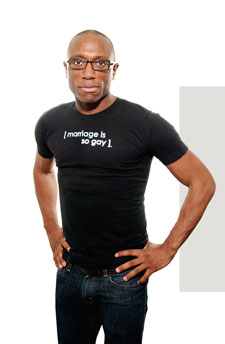
MW: That component of the Millennium March — of people coming together, networking, meeting face-to-face — is that a dinosaur? Do we move it online?
CRAWFORD: I wouldn’t say that it’s a dinosaur. And I don’t think we should move everything online. We should do both. If we’re really, really smart, we will study the Obama campaign. We will do a graduate-level course in what Barack Obama did to win the last presidential election, and we will get over the idea that it’s all grassroots or that it’s all online.
Really, the most effective strategies are going to be the ones that blend the grassroots organizing — the Harvey Milk school of organizing — with a lot of the online organizing that’s been pioneered by groups like MoveOn. Fusing the two is what’s really going to give us the best possible chance of passing our legislative agenda, bringing more people into the movement — both gay and non-gay people — and really shifting the way people think about gay people.
MW: Speaking of strategy, the last town-hall meeting I attended on marriage equality in the District showed that there are plenty of ideas — some conflicting — about how we get to marriage. How do you get everyone moving in the same direction?
CRAWFORD: One of the things we talked about at [a recent] DC for Marriage meeting was how we reach out to members of the African-American community, to the faith community, how do we bring in young people? One person asked, because we were talking about Unitarians at that point, ”We already have them. Why do we need to think about reaching out them?” We may know that they’re supportive, just as we know a lot of gay people are supportive, but when we need those people — whether it’s to vote or to talk to friends and family, or to donate money — we have no way of contacting those people. So we really need to make sure that we’re bringing folks in, building up our base of support.
In terms of marriage here, it’s going to require that the gay community do things a little differently. One, every single gay person is going to have to participate on some level. Every single gay person in the city is going to have to be part of this fight, because once a marriage bill is passed and we’re facing the possibility of a Prop. 8-style ballot fight, the national anti-gay organizations are going to pour money into D.C. and we’re going to have to be ready to defend ourselves.
Two, we are going to have to realize that it’s not just about us. It’s not just gay people who think gay people should be able to marry, but a lot of our straight friends and families believe that as well. We’re going to have to create spaces where non-gay people can work with us in terms of pushing for marriage equality. And we’re going to have to do a lot of the work that we haven’t done before, in terms of reaching out to folks outside of the gay community, including the African-American community and communities of faith.
MW: People have fears about stepping outside of their comfort zones to make bridges, and fear is so difficult to overcome. Is that what you’re asking them to do?
CRAWFORD: It’s about figuring out who will be the best messengers, what’s the best message for them to communicate, and how do we bring those people into the campaign we’re trying to build?
The way I’m looking at DC for Marriage, it’s not a gay thing. It’s a group of gay and non-gay people who are committed to winning marriage equality in the District. And not just winning it, but keeping it, because we know at some point we’re probably going to face a fight around congressional intervention.
In that regard, we will accept help from anybody who’s committed to marriage equality. My way of thinking is that if you think you don’t have any particular skill that would be useful, but you work at Starbucks and you can help us get free coffee when we’re sending people door to door? Great. We’ll gladly accept that help. There is a place for everybody in what we’re trying to do.
That’s something that’s a little different than what local organizations have done before. Folks like Bob Summersgill and Rick Rosendall have done a really, really great job of passing legislation to protect the LGBT community. They have done an amazing job around domestic partnerships and we now have one of the strongest domestic-partnership laws in the country. We need much more in the way of public education, community outreach, building support, talking to people, building relationships — that community-organizing stuff that Sarah Palin doesn’t think very highly of.
MW: How much contact do you have with Summersgill, Rosendall and others regarding strategy?
CRAWFORD: I talked to Bob twice this week. I had e-mail exchanges with him and Rick a number of times this week. We see each other in a lot of different contexts. At D.C. United, it’s me and Bob Summersgill, where we run into Rick Rosendall, and Barrett Brick, who used to be president of the Gay and Lesbian Activists Alliance. There are tons of gay people who go to the soccer games. In between the halves, a lot of the conversations we’ve had have been focused around how we create a campaign for marriage here. It’s surprising the number of gay activists you run into at a soccer game.
I think where Bob and Rick are is actually the same place I am. They may have a few more concerns about timing, but I think everyone wants to make sure we have a really smart strategy for how we move forward. They have a particular skill set in terms of policy and in working with the City Council. And I have a different skill set, in that by profession I’m an organizer. And I’m not just a grassroots organizer, but I have extensive experience in online organizing, and on campaigns and ”get out the vote.” So we’re joining forces to bring all that experience to bear, to create something that’s going to be really successful here.
Mitch Wood, the current president of GLAA, came to my house a few months back for a meeting of folks. With Gertrude Stein, I’m going to be at the next meeting on Monday (March 9), giving them an update on marriage. I’ve had extensive conversations with their president, Jeffrey Richardson, and Tim Mahoney, their vice president [for political affairs]. So the organizations are coming together, I think, in a way that they haven’t before.
We’re all committed to marriage. We’re just figuring out a way to work together that’s going to be unified, that’s going to help us build something effective. It’s not just about running around screaming, ”We want marriage!” It’s about doing that kind of step-by-step, grinding work that’s going to make it possible for us to win marriage and to keep it. The important thing to keep in mind is that we are fortunate enough to be in one of the most progressive jurisdictions in the country. If Congress did not have oversight over our laws, we would have marriage already.
MW: Councilmember David Catania (I-At large) seems most likely to introduce a bill for marriage equality in D.C. How closely are you working with him?
CRAWFORD: I talked to his office earlier this week. We’ve had ongoing conversations with them. We’re working together to figure out a strategy for timing of a bill’s introduction, how to build support in the community for it, how to get the strongest possible majority in the Council.
MW: So the chances of someone acting independently of the DC for Marriage strategy — present or future — is minimal?
CRAWFORD: They’re not absent. There are always people who sometimes ”go rogue.” I don’t necessarily mean that in a bad way. There are members of the Council who are extremely committed to marriage equality for residents of the District, which we think is amazing, really awesome. We’re in a unique position because no other jurisdiction can say that. I think sometimes people get so excited about wanting to do the right thing that they may actually go off and introduce a bill before all the bricks are quite dry. If that situation happens, we’ll just have to deal with it.
MW: Tell me about your work online. How many blogs are you involved with?
CRAWFORD: I have my personal blog, which is Bloggernista. I’m figuring out what’s happing with that. It’s probably going to be reshaped into a whole other thing. I’m managing editor of Bilerico-D.C.( http://dc.bilerico.com/), which is in its soft launch period right now. We’re going to have the official launch in two weeks. Then I also blog for the Huffington Post.
MW: Is blogging the day job? Are you earning an income from it?
CRAWFORD: Oh, please. There is no money in blogging unless you’re like Andrew Sullivan or Andy Towle. I work for a nonprofit called Public Citizen. I work in the global-trade division, focused around building support for a new model for U.S. trade policy. We want it to look not like NAFTA or the WTO. We want it to look like something that is going to have a much more positive impact on keeping American jobs here in America, rather than like tax breaks for corporations that outsource jobs to Third World countries. We want to ensure that our trading partners are respecting human rights, environmental protections, etc.
MW: How will Bilerico-D.C. differ from Bilerico?
CRAWFORD: The main site has about 60 contributors who come from all over the country. There are also two other state sites: Bilerico-Indiana and Bilerico-Florida. So Bilerico-D.C. will cover, essentially, gay life and politics inside the Beltway. Not just D.C., but Virginia and Maryland as well.
We’re going to cover what’s happening inside the Beltway, but we’re also the seat of the federal government. And from where I live I can walk to HRC, to the Victory Fund, to the Task Force. We’re also going to be, in a sense, trying to show a bit about how the push for legislation that impacts gays is actually being done, to show a little bit about how the sausage is made. We’re going to be covering some stuff that’s national, but not in a way that competes with the Bilerico site, but that complements it.
MW: How do you find the time?
CRAWFORD: A lot of my blogging is after work, on my lunch break and on weekends. It’s the same with DC for Marriage. That’s probably why I don’t have a boyfriend. There’s no time.
MW: Have you taken any vacation time recently?
CRAWFORD: I took the last two weeks of the election cycle off to focus on the Obama campaign. [My housemate] Phil [Attey] and I took almost a hundred gay folks from D.C. to five cities in southern Virginia for the last four days to help get out the vote. That was my vacation. At that time and that place, I would not have wanted to do anything else. My next vacation, this year, I do want to go somewhere that’s not campaign-related.
MW: With this sort of political, activist dedication, D.C. must be a much better fit than Houston.
CRAWFORD: My mom and grandma would’ve preferred that I stay in Houston, but I wanted to be here. The city itself is great. It’s much more energetic and dynamic than Houston. Houston is out of control in a lot of ways. The city itself, for lack of zoning, is just spread out and kind of L.A.-like in its size. D.C. is a walkable city. I think it’s friendlier. The gay community here is much more politically active, much livelier.
I’m not going back to Houston. D.C. is the place that I’m going to be. Except if Jake Gyllenhaal calls, and I’ll be like, ”Peace out.”
To learn more about DC for Marriage, visit www.dcformarriage.org. To read Michael Crawford’s online posts, visit The Bilerico Project at www.bilerico.com, Bilerico-D.C. at dc.bilerico.com, the Huffington Post at www.huffingtonpost.com, and Bloggernista at bloggernista.com.
Support Metro Weekly’s Journalism
These are challenging times for news organizations. And yet it’s crucial we stay active and provide vital resources and information to both our local readers and the world. So won’t you please take a moment and consider supporting Metro Weekly with a membership? For as little as $5 a month, you can help ensure Metro Weekly magazine and MetroWeekly.com remain free, viable resources as we provide the best, most diverse, culturally-resonant LGBTQ coverage in both the D.C. region and around the world. Memberships come with exclusive perks and discounts, your own personal digital delivery of each week’s magazine (and an archive), access to our Member's Lounge when it launches this fall, and exclusive members-only items like Metro Weekly Membership Mugs and Tote Bags! Check out all our membership levels here and please join us today!


















